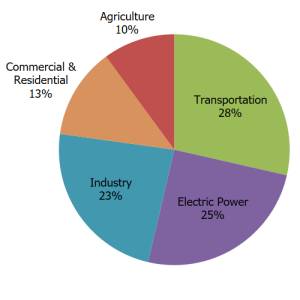As Seth Jaffe posted last week, the 9th Circuit recently struck down the City of Berkeley’s first-in-the-nation electrification ordinance that prohibited the installation of gas infrastructure in new buildings, finding the ordinance preempted by federal law. Leaving aside the merits of the appellate court decision—that a law setting national efficiency standards for household and commercial appliances prevents a local government from enacting an overall ban on infrastructure that enables gas use within new buildings—this type of ordinance is only one route for limiting fossil fuel use in buildings that states and local communities can use to address the climate crisis.
 Total U.S. Greenhouse Gas Emissions by Economic Sector in 2021.
Total U.S. Greenhouse Gas Emissions by Economic Sector in 2021.
(Source: EPA)
Burning gas and other fossil fuels in homes and businesses is one of the top 5 sources of climate pollution in the U.S. It also has serious implications for indoor air quality, with recent studies estimating that gas stoves contribute to our nationwide childhood asthma burden on par with secondhand smoke exposure. Readily available technologies like electric heat pumps and induction stoves are better for our health and the climate, far more efficient than their gas predecessors, and increasingly cost-effective.
That’s why many cities and states have enacted measures to require or encourage these clean technologies in new buildings. California, New York, and Washington state are among the leaders in adopting this common-sense solution. And even if the decision stands, the 9th Circuit’s ruling applies only to a small number of existing ordinances, and communities still have other valid approaches to achieve electrification.
The Energy Policy and Conservation Act (EPCA) explicitly allows cities to electrify buildings through local building codes that set overall efficiency standards that favor electric appliances over ones burning fossil fuels. That’s what many cities in California have done. While these rules are a bit more cumbersome to enact than an outright electrification requirement, they are not impacted by the decision in Berkeley. New York City is taking another approach: instead of regulating the efficiency of appliances, it sets indoor air quality standards for fuels burned in new buildings that make burning fossil fuels impracticable. California’s Bay Area Air Quality Management District also recently enacted zero-emission standards for newly sold appliances that take effect starting in 2027. These kinds of regulations, authorized under both federal and state law, are also not impacted by the Berkeley decision.
Ending gas combustion in homes is critical to addressing the climate crisis and protecting kids’ health. The 9th Circuit’s ruling is a setback, no doubt about it. Fortunately, plenty of legal options remain for cities and states to electrify to reach crucial zero emissions and human health goals.